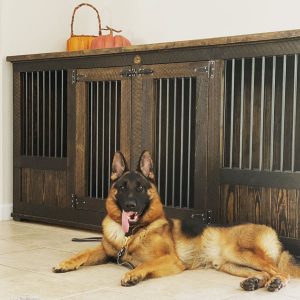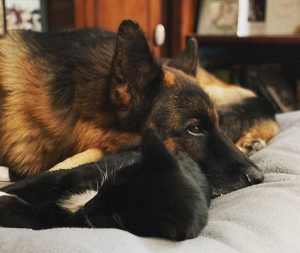When it comes to owning a German shepherd dog, one factor that we all know is that they have thick beautiful coats. With this thick coat comes some upkeep that needs to be done on our end as owners. A common question that we at Canine Extreme get is; what combs and brushes do I use? While this can be based on preference, there are a few standard brushes that will benefit your furry friend. In this article, you will find a brief breakdown of some of the grooming needs that your German Shepherd dog has.
Should You Crate Train Your German Shepherd
 Crate training can be an extremely beneficial part of a dog’s life. While some owners may not feel that it’s right placing their dog in a crate, the benefits that the training provides can actually help keep your dog calm and happy! We believe that crate training is very important to the foundation of every dog’s training. It gives your dog a “safe space”, can assist with housebreaking and is great for preparing for travel and emergency situations with your dog.
Crate training can be an extremely beneficial part of a dog’s life. While some owners may not feel that it’s right placing their dog in a crate, the benefits that the training provides can actually help keep your dog calm and happy! We believe that crate training is very important to the foundation of every dog’s training. It gives your dog a “safe space”, can assist with housebreaking and is great for preparing for travel and emergency situations with your dog.
When beginning crate training, its best to start at an early age. The most important factor to keep in mind when training is ensuring that the crate is linked with an enjoyable experience, rather than a punishment. If we do our best to keep the crate a pleasant area, it will help make this process easier. Think of it as your dog’s private oasis – an area they will feel comfortable to go to and will want to use as their own space to relax! Even though your dog’s home is your home, they enjoy having a place to get away from everything, just as we do! Merely leaving the crate open once your dog is trained, you’ll find they may go inside when they just want some “me-time.” This can be extremely beneficial if a dog has recently had surgery or an injury and needs to be placed on rest. The dog will be more likely to relax and rest in the kennel than be wound up around the house, possibly further injuring themselves.
 If you have a puppy and are looking to crate train them, we have some tips for you! We all know that puppies love to get into everything and can be a bit of a handful. When starting out, the crate should be used as a place to house your puppy when you can’t keep eyes on them. During this time, the puppy will learn to hold their bladder, as most puppies don’t want to use the restroom in their kennel. However, accidents may slip occasionally! This should not deter you from your crate training path though, because consistency is key, and your puppy will soon learn to hold it overnight. It’s also important to have a kennel that is the right size for the puppy. If the kennel is too large, your puppy can use the restroom in the corner and not be bothered by it. Please keep in mind that some puppies will cry during crate training, but that is normal! They will learn to relax and associate the crate with a space to rest.
If you have a puppy and are looking to crate train them, we have some tips for you! We all know that puppies love to get into everything and can be a bit of a handful. When starting out, the crate should be used as a place to house your puppy when you can’t keep eyes on them. During this time, the puppy will learn to hold their bladder, as most puppies don’t want to use the restroom in their kennel. However, accidents may slip occasionally! This should not deter you from your crate training path though, because consistency is key, and your puppy will soon learn to hold it overnight. It’s also important to have a kennel that is the right size for the puppy. If the kennel is too large, your puppy can use the restroom in the corner and not be bothered by it. Please keep in mind that some puppies will cry during crate training, but that is normal! They will learn to relax and associate the crate with a space to rest.
Anything can happen in our lives, and it’s essential to have a game plan for those scenarios. If something happens and you need to leave your dog by themselves or travel with them, the crate is going to be your go-to method of housing or transporting. If your dog has been crate trained, it really makes this a less stressful task for you and for your dog. Even if the transport seems like a stressful situation to you, your dog will have associated the crate with a place to relax and won’t be as nervous as a non-crate trained pup would be. The same rules apply if you need to leave your house for extended periods of time. If the dog is in the crate, you don’t have to worry as much about them while you are gone, as they are crate trained and will feel more relaxed. Plus, once the matter is taken care of, you can come home and let them out like any other normal day! It’s great to have your dog crate trained for normal day-to-day things, but definitely will come in handy for the both of you during emergencies.
 Overall, crate training is an important part of a dog’s life and will be a great addition to your lifestyle! It provides a safe, comfortable, and personal space for your dog to go into and relax while learning proper house behavior. Above all, it takes away the worry if you ever need to place your dog in a crate. Do keep in mind that the time it takes to crate train varies with each dog. They each have different personalities, and some take to it more quickly than others. It is best to go slow and make sure the dog enjoys being in the crate! You will both benefit from the results.
Overall, crate training is an important part of a dog’s life and will be a great addition to your lifestyle! It provides a safe, comfortable, and personal space for your dog to go into and relax while learning proper house behavior. Above all, it takes away the worry if you ever need to place your dog in a crate. Do keep in mind that the time it takes to crate train varies with each dog. They each have different personalities, and some take to it more quickly than others. It is best to go slow and make sure the dog enjoys being in the crate! You will both benefit from the results.
Common Questions
Q: What age should I start crate training my dog?
A: The sooner, the better! If you bring your puppy home at eight weeks old, you can begin that day or night. Crate training is all about constancy.
Q: I have an older dog, is it to late to being crate training?
A: It’s never to late to teach an older dog new tricks! You can begin crate training at any age and we recommend it.
Q: What size crate should I get?
A: The size crate needed depends on the size of the dog. We personally like to use Petmate intermediate size for puppies and some young dogs, and then as they grow, switch them to a Petmate Sky Kennel Giant for our adults. However, as every dog grows at a different rate and size, you want to pick something that is not too large, but the dogs can still stand up and turn around in comfortably.
More Articles
Bathing Your German Shepherd
While nothing can compare with that new puppy smell, sometimes it can take a turn in the wrong direction. Having a German Shepherd in the home can be a memorable experience that brings joy to any household. However, keeping your pup clean and smelling wonderful can be a bit overwhelming at times. Rest assured, this part of owning a german shepherd can be an easy task that can also be enjoyable and a fun time!
How To Read A Canine Extreme Pedigree
Reading a pedigree can be a daunting and even a confusing task at first. Rest assured, there is a pattern to the pedigree that once understood, it becomes much more straightforward. Knowing how to read the pedigree can provide you with valuable information on the dog and their lineage. You can find various information on a dog’s pedigree, such as names, parents, grandparents, date of birth, and titles. Below you will find a Canine Extreme pedigree that has been broken into sections to help read and understand a pedigree: